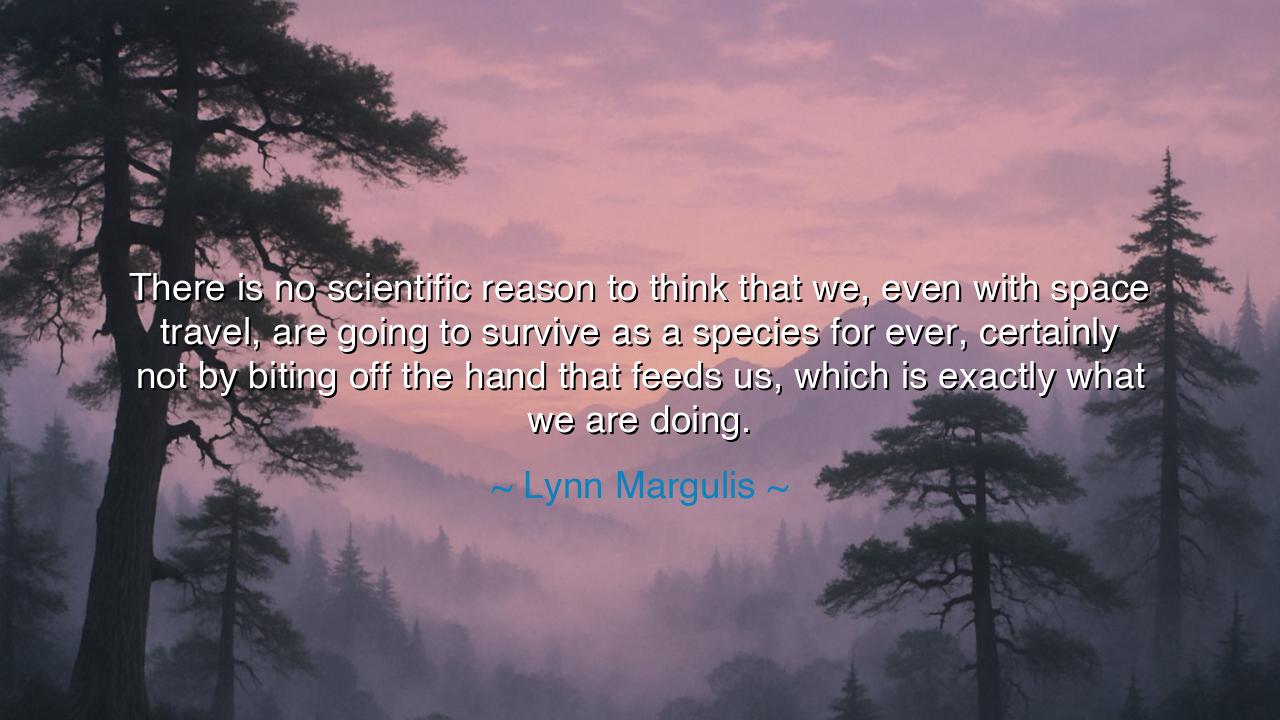
There is no scientific reason to think that we, even with space
There is no scientific reason to think that we, even with space travel, are going to survive as a species for ever, certainly not by biting off the hand that feeds us, which is exactly what we are doing.






Lynn Margulis, the fierce biologist whose vision reshaped our understanding of life itself, once warned: “There is no scientific reason to think that we, even with space travel, are going to survive as a species forever, certainly not by biting off the hand that feeds us, which is exactly what we are doing.” These words burn with both clarity and sorrow, for they remind us that human destiny is not guaranteed, that survival is not our birthright, and that our greatest danger comes not from the stars above but from our own reckless betrayal of the earth beneath us.
The first wisdom here lies in her dismissal of permanence. Humanity, intoxicated by its own power, often imagines itself eternal, as if our species were immune to the cycles that have extinguished countless forms of life before us. Margulis cuts through this illusion: there is no scientific reason to think we shall live forever. Dinosaurs ruled for ages, yet fell. Civilizations rose and collapsed, their temples swallowed by sand and jungle. Why should we believe we are different? This humbling truth demands reverence, not arrogance.
The second truth rests in her mention of space travel. Many look to the stars as a promised escape, a new ark for humanity when the earth is spent. Yet Margulis warns that no technology, no rocket, no shining colony beyond the atmosphere will save us if we cannot learn to respect the one world that sustains us now. To imagine survival among the stars while destroying our home is folly—a child abandoning their hearth while setting fire to it. Space travel may inspire, but it cannot excuse our desecration of earth.
Her harshest image is the act of biting off the hand that feeds us. This hand is nature itself—the soil, the forests, the oceans, the air. It feeds us with breath, with water, with grain, with life. Yet we poison rivers, scorch forests, and choke the skies with our excess. To harm the earth is to harm ourselves, yet we persist, as though we could devour the very roots of our sustenance and still flourish. Here her words echo ancient wisdom: that hubris invites ruin, that those who strike the gods—or in this case, the living earth—will be struck down in turn.
History provides us with mirrors of this folly. The civilization of Easter Island felled its last tree, and with it, the foundation of its survival. The Mayans exhausted their land, and their empire withered. Even mighty Rome, when it neglected its soil and drained its provinces, decayed into ruin. These are not myths but warnings, carved into time: no empire, no people, no species can survive when it destroys the systems that nourish it.
Yet within Margulis’s warning is also hope. For if our destruction comes from ignorance, then survival must come from wisdom. She devoted her life to understanding the deep cooperation that built life: bacteria joining with other cells to create new beings, ecosystems thriving through symbiosis, life flourishing not through conquest but through partnership. Her very science testified that survival is born of unity and respect. If we learn to live with the earth, not against it, then perhaps the hand that feeds us will remain open, and we may yet endure.
The lesson is clear: do not take survival for granted. We are not eternal; we are fragile. If we wish to continue, we must honor the earth, restrain our appetites, and live as part of nature’s great web rather than as its destroyers. Space travel may inspire us, but it cannot replace the work of stewardship here and now. To live wisely is to nourish the hand that nourishes us.
Practical counsel follows: reduce what you waste, cherish what you consume, and fight for the protection of the forests, oceans, and skies. Teach others that our strength lies not in domination but in harmony. For as Margulis reminds us, eternity is not promised. Survival is a choice—a choice we must make every day, by honoring the earth that has carried us this far.






AAdministratorAdministrator
Welcome, honored guests. Please leave a comment, we will respond soon